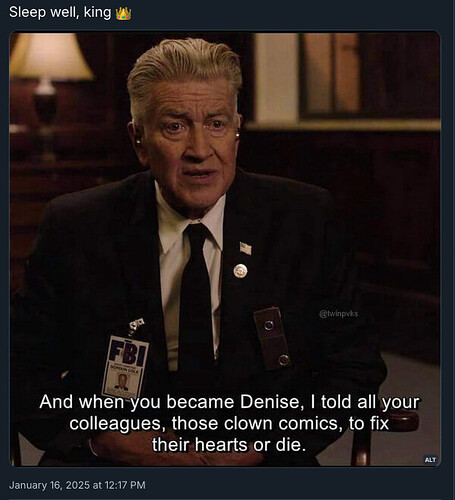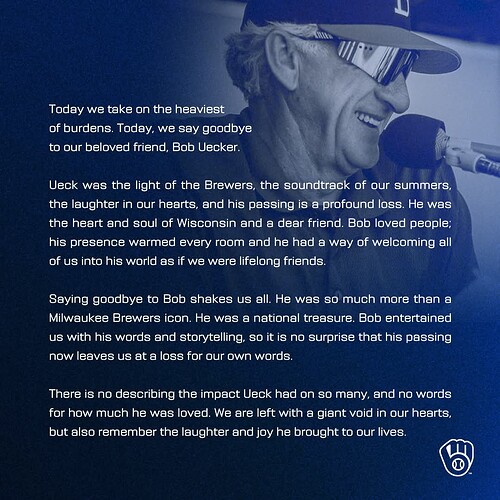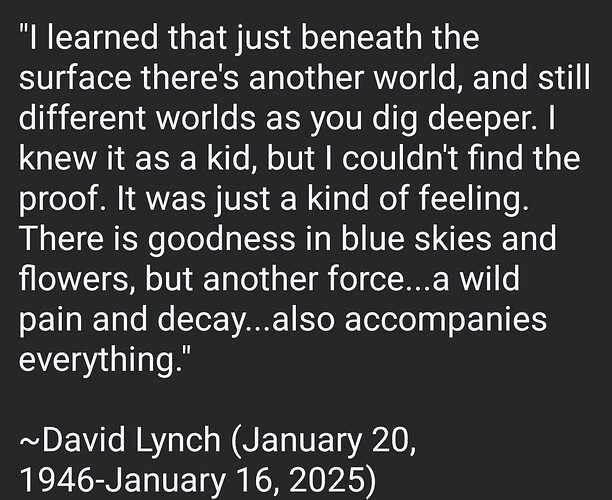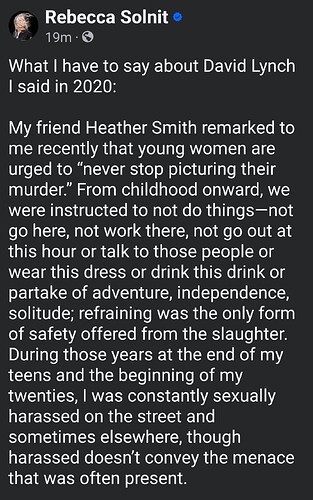The woman in the radiator creeped me out even more than the baby goat head.
By a horrid coincidence I was listening to the sad story of Jimmy Scott today and how he performed in Twin Peaks
The documentary
The radiator scene was what locked me into and staying with my first viewing of Eraserhead (my introduction to Lynch) and subsequent viewings for a fuller understanding of the flick. Why? When I was of pre-school age, I fantasized that the Devil dwelled behind the steam radiator in my bedroom. I felt no fear with that fantasy. For me, the radiator’s upright all-vertical all-business construction appeared to be like a gate to somewhere, and the radiator scene made me wonder then if Lynch and I were on the same wavelength. As that turned out, occasionally enough. Good enough for me.
If you’re on a voyage at the moment, David, I hope it is tres bon.
I was just thinking about David Lynch a few days ago, wondering if he was okay amidst the fires (I recalled he lived in that area because of his daily weather reports, where he’d always say “Here in LA…”). His area was forced to evacuate, which was worrisome because he’d been homebound for a while due to his emphysema and the risk of catching COVID. I really hope that didn’t end up being his cause of death. Either way, it’s extra sad that he probably was forced to spend his last days away from his home because of the fires. I hope it was at least in the company of friends and loved ones. ![]()
I can think of a couple of people I would have preferred had died today.
If you write in, we still might be able to save Twin Peaks.
I had a similar experience with Blue Velvet, right from the opening scene, with a man dying of a heart attack and his dog distracted by playing with water from a hose, while the camera went, oddly, underneath them, into the insect-crawling earth. The subterranean, surreal, and dream-like feel of so much of his work felt to me like it was getting at something that’s in a way more real than much of the supposedly real world I lived in.
Then in BV, Lynch shows a totally unnecessary cheerful scene of a robin (?) singing outside a kitchen (?) window… and the bird is an incredibly obvious fake mechanical POS! First real horrors… then saccharine little fakes! Damn, I miss him.
Right on both counts. “Reality” has been restored, with nastiness and such shoved back “underground.”
I was never a big baseball fan. But his voice over WTMJ are some of my earliest memories of summer. I would hear him on my brother’s RadioShack portable radio that was always tuned to Brewers’ games. In the quiet moments you could hear the crackle of far-distant thunderstorms.
What bothered me though about so many of Lynch’s stories was the women characters, often treated so violently, and further, as devices that were meant to tell us something about the actually important characters, who were men.
The rest of an excerpt ftom Solnit's memoir, Recollections of My Nonexistence
The former Marine David J. Morris, author of a book on post-traumatic stress disorder, notes that the disorder is far more common and far more rarely addressed among rape survivors than combat veterans. He wrote me, “The science on the subject is pretty clear: according to the New England Journal of Medicine, rape is about four times more likely to result in diagnosable PTSD than combat. Think about that for a moment—being raped is four times more psychologically disturbing than going off to a war and being shot at and blown up. And because there are currently no enduring cultural narratives that allow women to look upon their survival as somehow heroic or honorable, the potential for enduring damage is even greater.”
In war the people who try to kill you are usually on the other side. In femicide, they’re husbands, boyfriends, friends, friends of friends, guys on the street, guys at work, guys at the party or the dorm, and, the week I write this, the guy who called a Lyft and stabbed the pregnant driver to death and the guy who went into a bank and shot five women and the guy who shot the young woman who took him in when his parents kicked him out, to name a few examples of the carnage that made it into the news.
Morris calls PTSD “living at the whim of your worst memories.” But he also suggests that war, as an atmosphere in which you live in fear of attack, mangling, annihilation, and in which people around you suffer those afflictions, can traumatize you even if you are physically untouched, and the fears can follow you long after what gave rise to them. Mostly when people write about the trauma of gender violence, it’s described as one awful, exceptional event or relationship, as though you suddenly fell into the water, but what if you’re swimming through it your whole life, and there is no dry land in sight?
Legions of women were being killed in movies, in songs, in novels, and in the world, and each death was a little wound, a little weight, a little message that it could have been me. I once encountered a Buddhist saint who had worn tokens devotees gave him; they loaded him up, tiny token by tiny token until he was dragging hundreds of pounds of clinking griefs. We wore those horror stories as a secret weight, a set of shackles, that dragged along everywhere we went. Their clanging forever said, “It could have been you.” During this time, I gave away the only television I ever owned, my maternal grandmother’s little black-and-white model from her nursing home, not long after an evening when I turned the dial and found that a young blonde woman was being murdered on each channel. It could have been me.
I felt hemmed in, hunted. Over and over, women and girls were attacked not for what they’d done but because they were at hand when a man wished to—to punish is the word that comes to mind, though for what might linger as a question. Not for who but for what they were. We were. But really for who he was, a man who had the desire and believed he had the right to harm women. To demonstrate that his power was as boundless as her powerlessness.
In the arts, the torture and death of a beautiful woman or a young woman or both was forever being portrayed as erotic, exciting, satisfying, so despite the insistence by politicians and news media that the violent crimes were the acts of outliers, the desire was enshrined in the films of Alfred Hitchcock, Brian De Palma, David Lynch, in so many horror movies, so many other films and novels and then video games and graphic novels where a murder in lurid detail or a dead female body was a standard plot device and an aesthetic object. Her annihilation was his realization. For the intended audience, it was apparently erotic, because in life women kept getting murdered in the course of sex crimes, and the fear of assault, of rape, was also a fear of violent death.
Which was a reminder that I was, we were, not the intended audience for so much art, including the stuff lauded as masterpieces and upheld as canonical…

I think I found the best eulogy… and in a satirical newspaper:
https://www.elmundotoday.com/2025/01/david-lynch-rechaza-explicar-el-significado-de-su-propia-muerte/
(hastily scribed translation below, because I don’t think a machine translation will do much justice to the satire -clearly out of love- that this article permeates)
David Lynch refuses to explain the meaning behind his own death
The director of 'Mulholland Drive' embraces the irrational in a difficult to palate proposal
David Lynch, the visionary director that changed independent cinema in USA since the 80’s, has died and true to his style, and as he did through all of his career with his disquieting movies, has refused after the fact to explain the meaning behind his own dead, which each one of us will have to find at our own pace.
“…”, declared the director of Eraserhead or Blue Velvet when inquired to delve about the ultimate meaning of his passing.
The difficult to understand death of Lynch has fascinated some critics and dumbfounded most, though they know is useless to ask him about it. “David Lynch is dead? But… but… I don’t understand anything, what an unsatisfactory ending… I don’t know if I should be sad, or angry or… What a fucking genius”, some fans declared upon the notice of decease of the director, that now has brought to his grave the secret behind his own death, difficult to understand and swallow to any cinephile.
The death of Lynch, that prioritizes once more questions over answers and trascending the limits of cinematography, has already been labeled as “lynchian”.
Rest in peace, maestro
This is a good one, too…
That’s a lovely eulogy.
My first experience with Lynch was as a teenager around 1981. I’d go with my best friend to see weird films at the Colonnade theater in the LSU student union. Elephant Man had already been released, but Lynch wasn’t really a “name” yet. All I knew going in was that Eraserhead was supposed to be “really weird” and “obscure” (despite being pretty recent at the time). The theater was mostly empty, confirming my youthful expectations. Well, needless to say, it was an indelible experience, instantly burned into my memory.
Come to think of it, that was right around the time I started moving away from my churchy, youth-group upbringings and into the world of the strange. Did Eraserhead change my life? I can’t point to the film specifically, but it surely played a major role in the beginnings of my personal enlightenment. Thank you, David Lynch.
I’m fairly certain I saw Elephant Man as a kid and probably Dune, too, but did not process who the director was (I would have been a young kid), so for me it was Twin Peaks, which aired at just the right time when I was a teen. Just, the whole revelation of rot underneath that veneer of normalcy in a small town… what’s not to love from a weird kid who never found a way to fit in with everyone else. I was utterly obsessed with the show, even after the rest of my family lost interest. I loved both the mellow drama and the weird, mystical side of it… I probably couldn’t have articulated it at the time, but it helped me understand why I was unable to fit in with everyone else, and why I was so profoundly unsatisfied with everything around me. Still am to an extent. But the weird things of the world provide a space for some truth, and he spoke to that…
That’s really well put. I too feel and appreciate the hidden world that surrounds us (obscure: hidden), and Lynch helped make me aware of its existence (along with LSD). “There are more things in Heaven and Earth, Horatio, than are dreamt of in your philosophy.” Lynch knew this.
He really did. He had a keen eye for this kind of thing and was able to put them in a form that we could all grasp.







